Ditapis dengan
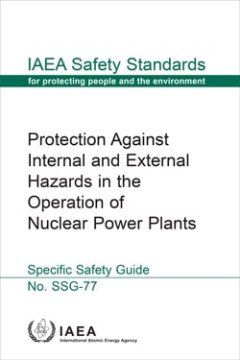
Protection Against Internal and External Hazards in the Operation of Nuclear …
This Safety Guide provides specific recommendations on protection against internal and external hazards in the operation of nuclear power plants. It provides new or updated recommendations derived from enhanced understanding of operational aspects of hazards and combinations of hazards. Operating experience gained from incidents and accidents in nuclear power plants around the world has demonst…
- Edisi
- -
- ISBN/ISSN
- 978–92–0–101522–8 (pdf)
- Deskripsi Fisik
- 83 p
- Judul Seri
- IAEA safety standards series
- No. Panggil
- 621.039.58 IAE p
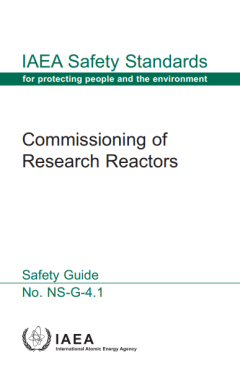
Safety Standards-Safety Guide:Commisioning of Research Reactors(NS-G-4.1)
This Safety Guide was developed under the IAEA programme for safety standards for research reactors, which covers all the important areas of research reactor safety. It supplements and elaborates upon the safety requirements for the commissioning of research reactors that are established in the IAEA Safety Requirements publication on the Safety of Research Reactors [1]. It also relates to the I…
- Edisi
- -
- ISBN/ISSN
- -
- Deskripsi Fisik
- -
- Judul Seri
- -
- No. Panggil
- 621.483 IAE C
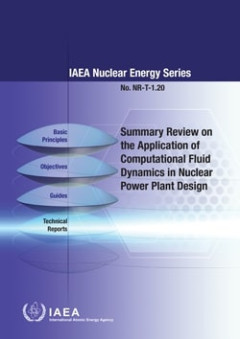
Summary Review on the Application of Computational Fluid Dynamics in Nuclear …
The IAEA’s statutory role is to “seek to accelerate and enlarge the contribution of atomic energy to peace, health and prosperity throughout the world”. Among other functions, the IAEA is authorized to “foster the exchange of scientific and technical information on peaceful uses of atomic energy”. One way this is achieved is through a range of technical publications including the IAEA…
- Edisi
- -
- ISBN/ISSN
- 978–92–0–100321–8
- Deskripsi Fisik
- 80 p
- Judul Seri
- IAEA nuclear energy series
- No. Panggil
- 621.039.5:532 IAE s
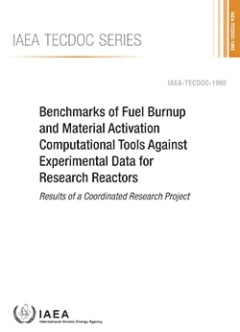
Benchmarks of Fuel Burnup and Material Activation Computational Tools Against…
Research reactors are powerful tools that contribute to scientific and technological progress worldwide. They are used for research and development in a wide variety of fields, in capacity building in nuclear science and technology, to produce radioisotopes crucial for medical and industrial applications, to support the development of national nuclear infrastructure, and in many other research …
- Edisi
- -
- ISBN/ISSN
- 978-92-0-101222-7
- Deskripsi Fisik
- 276 p
- Judul Seri
- IAEA TECDOC series
- No. Panggil
- 621.483 IAE b
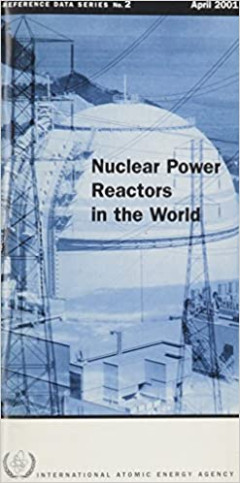
Nuclear Power Reactors in the World. April 2001 Edition
This is the twenty-first edition of Reference Data Series No. 2, which presents the most recent reactor data available to the Agency. It contains summarized information as of the end of 2000 on: (1) power reactors operating or under construction, and shut down; and (2) performance data on reactors operating in the Agency's Member States, as reported to the Agency. The information is collected b…
- Edisi
- -
- ISBN/ISSN
- -
- Deskripsi Fisik
- -
- Judul Seri
- Reference Data Series No. 2
- No. Panggil
- 621.483 IAE N
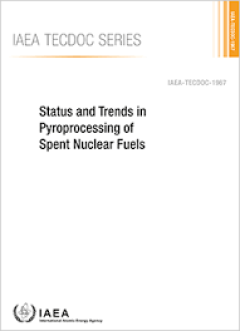
Status and Trends in Pyroprocessing of Spent Nuclear Fuels: IAEA TECDOC No. 1967
The importance of recycling the spent nuclear fuel through partitioning processes has been recognized worldwide for increasing and sustaining nuclear energy. Therefore, the development of advanced partitioning processes, based either on hydrometallurgical or on pyrometallurgical technologies, has received an increasing interest in recent years. Moving towards industrial demonstration, partition…
- Edisi
- 2021
- ISBN/ISSN
- 978-92-0-122821-5
- Deskripsi Fisik
- 150 p
- Judul Seri
- -
- No. Panggil
- 363.7289 IAE s
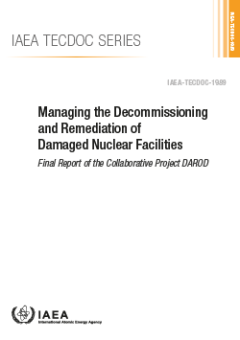
Managing the decommissioning and remediation of damaged nuclear facilities - …
In response to the accident at the Fukushima Daiichi nuclear power plant in March 2011, the IAEA developed the IAEA Action Plan on Nuclear Safety. One of the objectives of the plan was to ensure that, following a nuclear emergency, people and the environment are protected from ionizing radiation. One of the activities undertaken to address this objective was the International Project on Mana…
- Edisi
- 2021
- ISBN/ISSN
- 978-92-0-142521-8
- Deskripsi Fisik
- 136 p
- Judul Seri
- -
- No. Panggil
- 539.7 IAE m
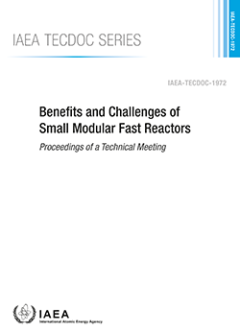
Benefits and Challenges of Small Modular Fast Reactors: IAEA TECDOC No. 1972
The IAEA ussually defines small and medium sized or modular reactors (SMRs) as reactors producing up to 300 MW(e) (small sized or small modular) and reactors producing 300-700 MW(e) (medium sized). There has been increasing interest in SMRs globally owing to their variois benefits, such as flexible power generation options, the wide range of applications, enhanced safety resulting from inherest…
- Edisi
- 2021
- ISBN/ISSN
- 978-92-0-124121-4
- Deskripsi Fisik
- 362 p
- Judul Seri
- -
- No. Panggil
- 621.483 IAE b
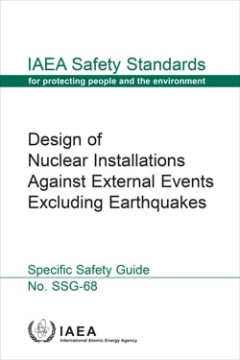
Design of Nuclear Installations Against External Events Excluding Earthquakes…
The status of the IAEA safety standards derives from the IAEA’s Statute, which authorizes the IAEA to establish or adopt, in consultation and, where appropriate, in collaboration with the competent organs of the United Nations and with the specialized agencies concerned, standards of safety for protection of health and minimization of danger to life and property, and to provide for their appl…
- Edisi
- IAEA Safety Standards Series.
- ISBN/ISSN
- 978-92-0-136121-9
- Deskripsi Fisik
- 112 p
- Judul Seri
- IAEA Safety Standards Series.
- No. Panggil
- 621.039.58 IAE d
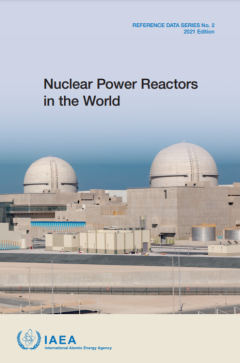
Nuclear Power Reactors in the World 2021 Edition Reference Data Series No. 2
This is the 41st edition of Reference Data Series No. 2, which presents the most recent reactor data available to the IAEA. It contains summarized information as of the end of 2020 on power reactors operating, under construction and shut down as well as performance data on reactors operating in the IAEA Member States. The information is collected through designated national correspondents in th…
- Edisi
- 2021
- ISBN/ISSN
- 978-92-0-124421-5
- Deskripsi Fisik
- 94 p
- Judul Seri
- -
- No. Panggil
- 539.7 IAE n
 Karya Umum
Karya Umum  Filsafat
Filsafat  Agama
Agama  Ilmu-ilmu Sosial
Ilmu-ilmu Sosial  Bahasa
Bahasa  Ilmu-ilmu Murni
Ilmu-ilmu Murni  Ilmu-ilmu Terapan
Ilmu-ilmu Terapan  Kesenian, Hiburan, dan Olahraga
Kesenian, Hiburan, dan Olahraga  Kesusastraan
Kesusastraan  Geografi dan Sejarah
Geografi dan Sejarah